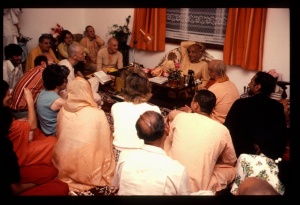BG 1.30 (1972)

A.C. Bhaktivedanta Swami Prabhupada
TEXT 30
- न च शक्नोम्यवस्थातुं भ्रमतीव च मे मनः ।
- निमित्तानि च पश्यामि विपरीतानि केशव ॥३०॥
- na ca śaknomy avasthātuṁ
- bhramatīva ca me manaḥ
- nimittāni ca paśyāmi
- viparītāni keśava
SYNONYMS
na—nor; ca—also; śaknomi—am I able; avasthātum—to stay; bhramati—forgetting; iva—as; ca—and; me—my; manaḥ—mind; nimittāni—causes; ca—also; paśyāmi—I foresee; viparītāni—just the opposite; keśava—O killer of the demon Keśī (Kṛṣṇa).
TRANSLATION
I am now unable to stand here any longer. I am forgetting myself, and my mind is reeling. I foresee only evil, O killer of the Keśī demon.
PURPORT
Due to his impatience, Arjuna was unable to stay on the battlefield, and he was forgetting himself on account of the weakness of his mind. Excessive attachment for material things puts a man in a bewildering condition of existence. Bhayaṁ dvitīyābhiniveśataḥ: such fearfulness and loss of mental equilibrium take place in persons who are too affected by material conditions. Arjuna envisioned only unhappiness in the battlefield—he would not be happy even by gaining victory over the foe. The word nimitta is significant. When a man sees only frustration in his expectations, he thinks, "Why am I here?" Everyone is interested in himself and his own welfare. No one is interested in the Supreme Self. Arjuna is supposed to show disregard for self-interest by submission to the will of Kṛṣṇa, who is everyone's real self-interest. The conditioned soul forgets this, and therefore suffers material pains. Arjuna thought that his victory in the battle would only be a cause of lamentation for him.